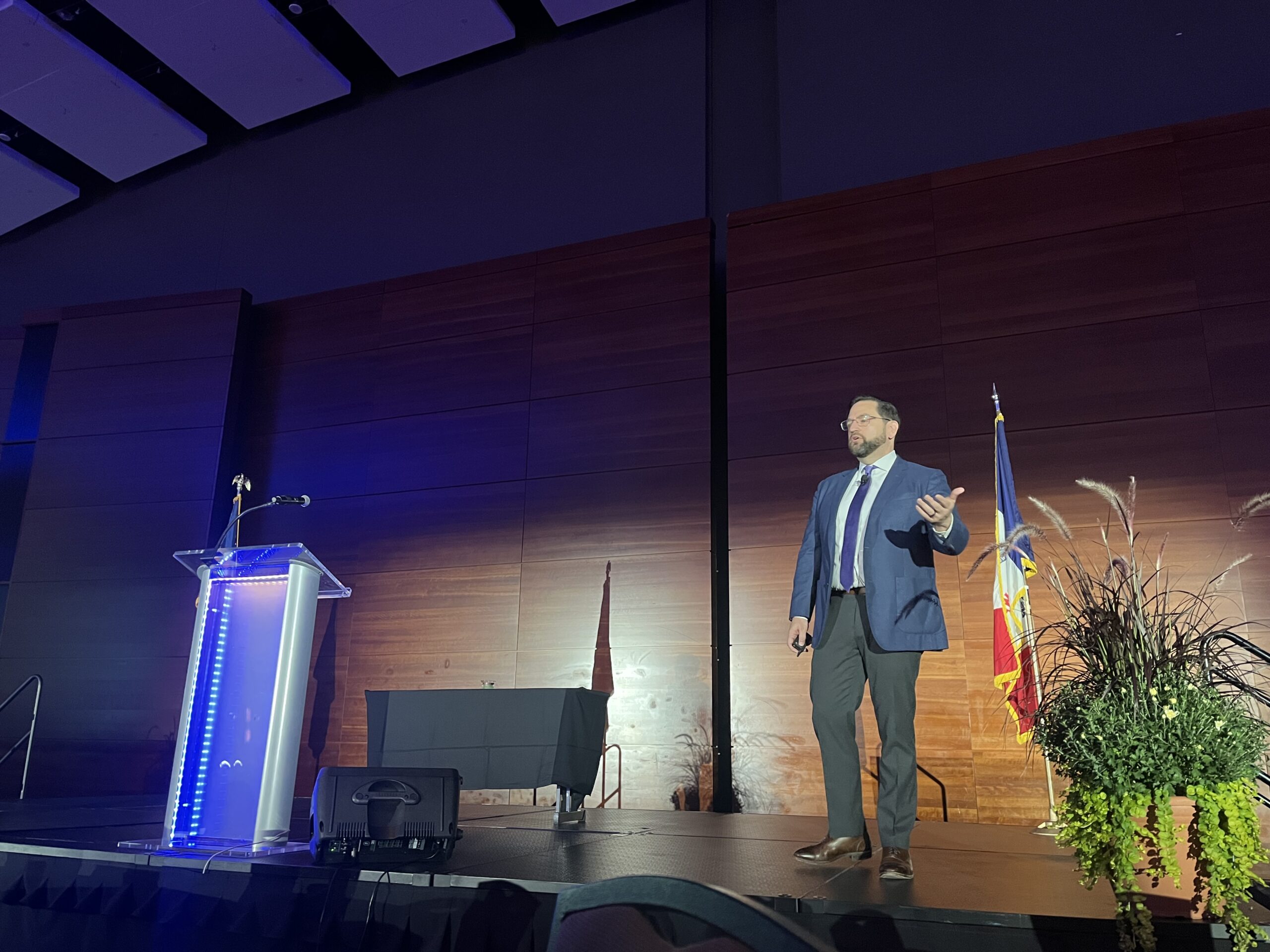AI a time saver for CRE professionals, ICREA speaker says at 2025 expo

Michael Crumb Sep 17, 2025 | 6:00 am
4 min read time
921 wordsAll Latest News, Real Estate and DevelopmentLearning to use artificial intelligence will help commercial real estate professionals save time, said Tim Rios, chief learning officer at the Lipsey Co.
Rios was a featured speaker at the Iowa Commercial Real Estate Association’s Expo 2025 on Sept. 10 at the Community Choice Credit Union Convention Center. He compared the evolution of AI to the rise in popularity of the internet in the 1990s.
A challenge for AI users is the changes that occur almost weekly in AI, but Rios said that challenge also creates opportunity.
“We’re not tech people and that’s really important to remember,” Rios told the group of about 430 people. “This can be an enabler for your business, but it isn’t our business.”
He encouraged commercial real estate professionals to “pick a leverage point in your business,” to focus on because “it’s simply too much to consume all at once.”
“The interesting thing about artificial intelligence is that I have never seen anything that saves commercial real estate professionals more time,” Rios said. “AI will help you find more time in your schedule than you ever thought possible.”
He said there isn’t a good answer to which AI platform or company to use.
Using AI can create problems if it provides bad information, and users of AI still need to do their own research, Rios said.
“That’s the single biggest mistake people make with AI,” he said. “They write a prompt and make a request and they expect whatever is coming back is not only correct, but it’s the best AI can do. Neither of which is 100% true.”
An example of an issue that arises frequently in commercial real estate, Rios said, is entering lease abstract information into AI.
“Now somebody else logs into the same system, and what has the system learned from the lease I just showed them, not directly in the sense that you’re going to say what another brokerage firm is doing with a lease … but everything can contribute to the learning of the system,” he said.
Another issue is allowing prompts to be used for training, Rios said.
“So, by default, most of your artificial intelligence systems, when you put in a prompt it is potentially subject to human review,” he said. “So, if the system is giving kind of weird answers, something’s happening. A human can go in there and see what happens. A lot of people don’t want their prompts, the questions you’re asking the artificial intelligence system, to be used.”
It’s important to learn the opt-in and opt-out abilities of the system being used to avoid having prompts used, Rios said.
He also warned against “unnecessary integrations.”
For example, when someone downloads a new app to their phone or computer, a prompt comes up asking for access to the camera, contacts list or microphone.
“A lot of times that integrations will be turned on and you can review those and say I don’t want you in my contacts, or my microphone. That’s just something to watch for.”
Most tech companies want the integrations turned on to generate ads specific to a user to generate revenue, Rios said.
Another example of where AI can be useful in commercial real estate is the generation of reports for clients that could include location maps, planned road construction and 3D models. Using AI won’t replace staff, but can complement staff and make processes more efficient, Rios said.
“Going hand-in-glove you need to start to leverage AI as an assistant and then also have a real person,” he said.
It’s important to be careful using AI for writing business letters because too often they can sound impersonal and not like the person writing the letter, Rios said.
He also advised caution not to use AI for high-level requests for proposals because research has shown 50% of documents written by AI are unoriginal.
Rios said it’s critical to give AI specific information when giving it prompts.
“If you want better answers in AI, you have to learn how to write better prompts,” he said. “If you say to AI, give me a letter of intent for retail space, you’re going to get something that is every bit as generic as your request.”
Instead of a generic prompt, include details such as square footage, tenant improvement allowance and rent terms, Rios said.
“Tell it what you want and don’t lack on the specifics,” he said.
Rios also advised that AI be used to record and document meetings. AI not only can provide a full transcription, but also a summary, allowing those in the meeting to better listen, read body language and communicate rather than be focused on taking notes.
Some systems can also help with coaching by providing feedback on a presentation and a speaker’s vocal variety and pace of speech, he said.
AI can also scan handwritten notes and transcribe it into a report or database, Rios said.
“Now, what will happen is that it will make some mistakes, but we can all edit faster than we can write,” he said. “AI allows us to be editors, not writers or typists.”
Rios said a company needs to ask what it wants to achieve before it chooses which AI system to use.
“What are you trying to solve?” he said. “That’s how we pick a system right now until the industry advances. Is it organization? Is it composing? Is it customer service? Is it summarizing complex interactions? There are a number of systems out there but they don’t do it all.”

Michael Crumb
Michael Crumb is a senior staff writer at Business Record. He covers real estate and development and transportation.











